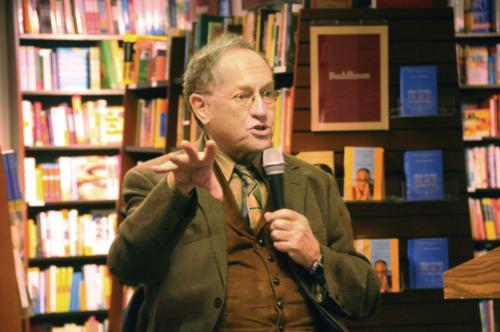
News
Summers Will Not Finish Semester of Teaching as Harvard Investigates Epstein Ties

News
Harvard College Students Report Favoring Divestment from Israel in HUA Survey

News
‘He Should Resign’: Harvard Undergrads Take Hard Line Against Summers Over Epstein Scandal

News
Harvard To Launch New Investigation Into Epstein’s Ties to Summers, Other University Affiliates

News
Harvard Students To Vote on Divestment From Israel in Inaugural HUA Election Survey
Dershowitz Takes Aims At ‘Israel’s Enemies’

The intensity of the discussion at the Harvard Coop bookstore yesterday evening rivalled that of the Presidential debate, as Professor Alan M. Dershowitz promoted his latest, highly controversial book, “In the Case Against Israel’s Enemies: Exposing Jimmy Carter and Others Who Stand in the Way of Peace.”
The Felix Frankfurter Professor of Law at the Harvard Law School, Dershowitz said that he uses the book, his 28th work, to challenge such public intellectuals as Noam Chomsky and President Jimmy Carter, who, in his opinion, de-legitimize the Israeli state.
A long time advocate of the Israeli state, Dershowitz said that Israel has long been subject to “a double standard” by the rest of the world, including the United Nations.
According to Dershowitz, there are three root causes of this anti-Israeli sentiment: Israel is a Jewish state; Israel is an ally of the US, and suffers from “veiled anti-Americanism”; and Israel does not produce oil, making the state useless.
Dershowitz took special pains to address Carter’s policies towards Israel, calling Carter’s book, “Palestine: Peace, Not Apartheid”, “full of bias.”
When asked about Carter’s receipt of the 2002 Nobel Peace Prize, Dershowitz said, “the Nobel Prize can be very political. Part of the reason he won the prize was probably anti-Semitic sentiment.”
At the same time, Dershowitz offered some qualified objections to Israel’s conduct.
“Criticism of Israel is a good thing,” he said, because “Israel has many faults.”
Dershowitz said that both sides of the Israeli-Palestinian conflict must compromise. Israel should end civilian settlements on the West Bank, while Palestinians must stop terrorism, Dershowitz said.
He suggested a two-state solution to remedy the hostilities, saying “I am convinced that what is good for Israel is also good for Palestine.”
Calling himself a critic of the Bush administration’s policies, Dershowitz said the next administration should be more involved in the peace process.
Dershowitz also said he hopes his book will stimulate informed discussions about Israel. He said he plans to donate copies of the book to several major colleges to ensure its availability for students.
After he had finished speaking about his book, Dershowitz took questions from the audience members, who both complimented and criticized his strong pro-Israel stance.
Marvin R. Brams, a student at the Divinity School, said that Dershowitz is “probably Israel’s best friend in America and maybe its best ally in the entire world.”
Lindsay M. Bigoness, a student at the Graduate School of Education, said that she had come to see Dershowitz speak because she had read his legal cases. Calling Dershowitz “a big icon,” Bigoness she admired Dershowitz because of his strong commitment to his cause. “It’s really inspiring to see someone who champions his ideas,” she said.
Want to keep up with breaking news? Subscribe to our email newsletter.
